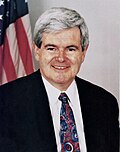This article consists almost entirely of a plot summary .(May 2025) |
 First edition | |
| Author | Newt Gingrich William R. Forstchen |
|---|---|
| Language | English |
| Genre | Alternate history novel |
| Publisher | Thomas Dunne Books |
Publication date | June 12, 2003 |
| Publication place | United States |
| Media type | Print (Hardback & Paperback) |
| Pages | 384 (1st edition) |
| ISBN | 978-0-312-30935-0 (1st edition) |
| OCLC | 51559226 |
| 813/.6 21 | |
| LC Class | PS3557.I4945 G48 2003 |
| Followed by | Grant Comes East |
Gettysburg: A Novel of the Civil War is an alternate history novel written by Newt Gingrich and William R. Forstchen. [1] It was published in 2003. It is the first part in a trilogy in which the next books are respectively Grant Comes East and Never Call Retreat .
